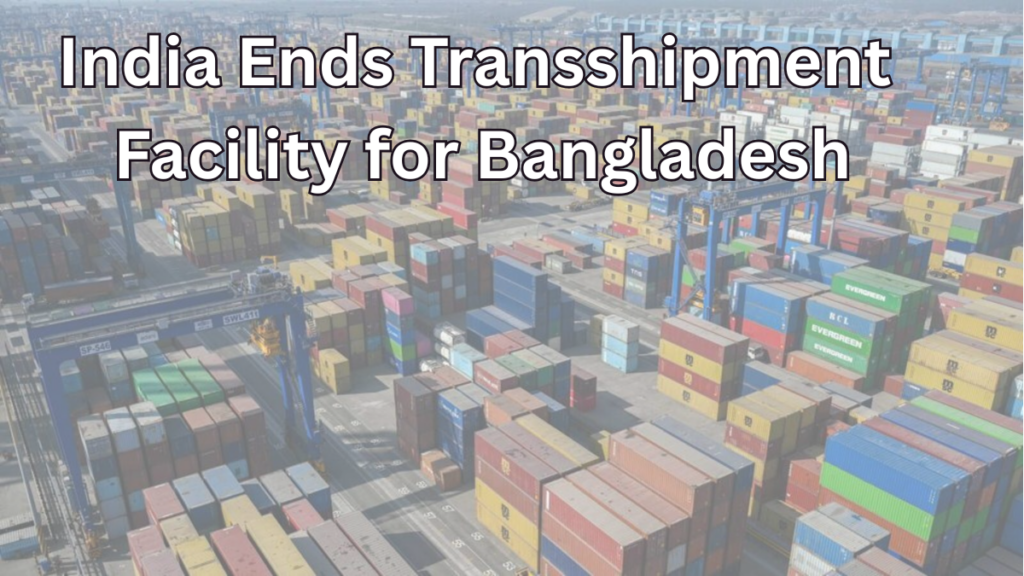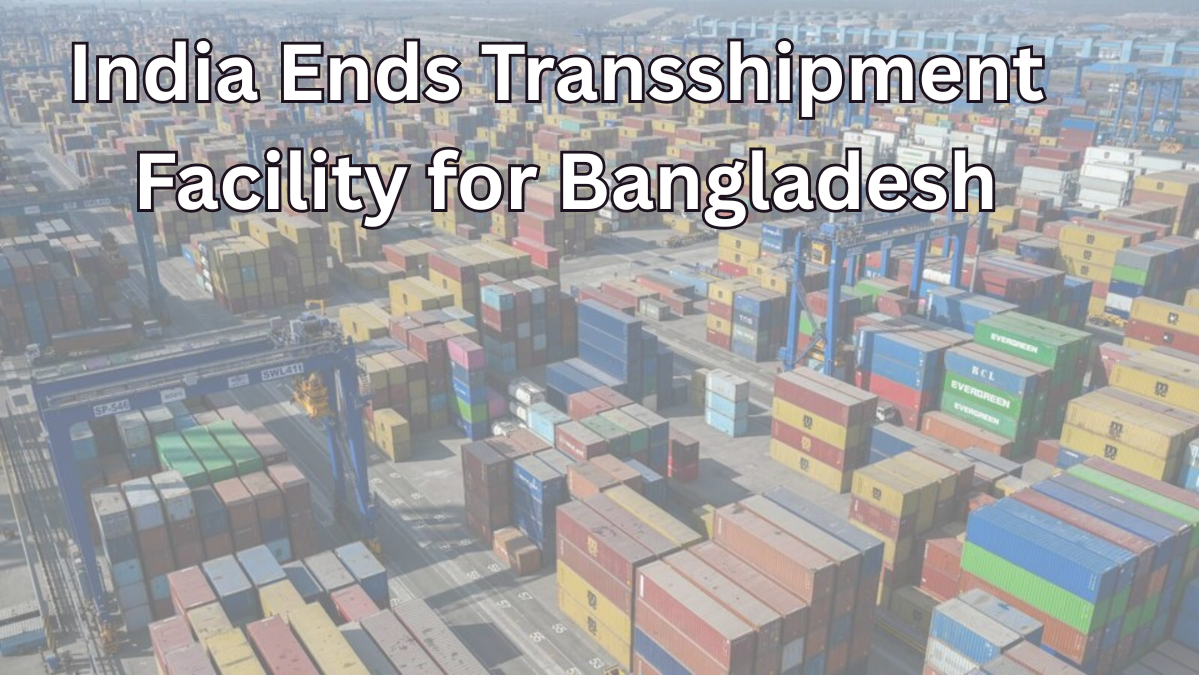India has made a significant policy shift that could reshape trade relations in South Asia. Just days after Bangladesh Chief Adviser Muhammad Yunus made bold remarks about regional geopolitics and economic corridors, India has pulled the plug on a crucial transshipment facility that allowed Bangladesh to use Indian territory for exporting goods to third countries.
Let’s unpack what led to this move, what it means for both nations, and how it might affect the larger trade ecosystem in the region.

What Is the Transshipment Facility — and Why Was It Stopped?
The transshipment facility allowed Bangladeshi export cargo to move through India via land customs stations (LCSs) to Indian seaports and airports for further shipping abroad. This arrangement, introduced in 2020, had made it easier for Bangladesh to connect with global markets.
However, according to a notification issued by the Central Board of Indirect Taxes and Customs (CBIC) on April 8, 2025, the Indian government has now revoked this provision.
Reasons Behind the Move:
-
Severe congestion at Indian ports and airports
-
Rising logistical delays and higher costs affecting Indian exports
-
Repeated demands from Indian exporters to halt the facility
-
Strategic concerns following Yunus’s remarks regarding Northeast India and China
What Did Bangladesh Say That Sparked Tensions?
During his visit to China (March 26–29), Muhammad Yunus emphasized the strategic significance of Bangladesh for the Northeast Indian region, also known as the Seven Sisters. His comments suggested that:
-
Northeast India is landlocked and depends on Bangladesh for ocean access
-
Bangladesh could become a gateway for Chinese trade and influence in the region
This sparked strong reactions from Indian political circles, especially as India has long been wary of increased Chinese presence near its sensitive Siliguri Corridor (Chicken’s Neck) — a narrow stretch connecting mainland India to the Northeast.
Strong Reactions from Indian Leaders
Assam Chief Minister Himanta Biswa Sarma responded sharply, calling Yunus’s remarks “offensive” and a threat to India’s sovereignty. He stressed the urgent need to:
-
Develop alternative routes connecting Northeast India with the mainland
-
Strengthen infrastructure to reduce dependence on the narrow corridor
Economic and Strategic Implications
The suspension of the transshipment facility has both economic and geopolitical ramifications.
For India:
-
Reduced port congestion
-
Lower freight costs for domestic exporters
-
Greater strategic autonomy in the Northeast region
For Bangladesh:
-
Trade disruptions with third countries
-
Increased reliance on Chinese ports or alternatives
-
Possible delay in shipments and increased export costs
At a Glance: Key Details
| Aspect | Details |
|---|---|
| Facility Introduced | 2020 (via CBIC circular) |
| Facility Withdrawn On | April 8, 2025 |
| Reason for Withdrawal | Port congestion, logistical delays, strategic concerns |
| Affected Trade | Bangladeshi cargo destined for third countries |
| Unaffected Trade | Bangladesh-Nepal and Bangladesh-Bhutan routes via India |
| Bangladeshi Official’s Statement | Dhaka is the “guardian of the ocean” for Northeast India |
| Indian Response | Strong condemnation; emphasis on reducing dependence on Bangladesh routes |
WTO Rules and Potential Legal Ramifications
Ajay Srivastava, former trade officer and Head of the Global Trade Research Initiative (GTRI), warned that this decision could be scrutinized under World Trade Organization (WTO) rules. According to GATT 1994 – Article V, countries must:
-
Allow freedom of transit for goods to and from landlocked nations
-
Avoid unnecessary delays
-
Refrain from imposing transit duties
Bangladesh, while not landlocked itself, was exporting to countries like Nepal and Bhutan that are — making this a legally grey but politically sensitive area.
Expert Commentary
“India has long offered tariff-free access to Bangladeshi goods. But strategic actions — such as inviting Chinese investment near Siliguri — have complicated trust,”
— Ajay Srivastava, GTRI
He added that while India may have valid logistical reasons, the decision sends a strong geopolitical message at a time when regional alignments are shifting.
FAQs
1. What is the transshipment facility that was withdrawn?
It allowed Bangladesh to export goods to third countries by transporting cargo through Indian land and seaports. This facilitated cost-effective access to global markets.
2. Does this affect all Bangladeshi trade passing through India?
No. The new rules do not affect cargo moving from Bangladesh to Nepal or Bhutan through India.
3. Is this move related to Bangladesh’s growing ties with China?
While not explicitly stated, many analysts believe the decision is partly in response to recent statements by Bangladeshi officials about Northeast India and Dhaka’s strategic importance — which included hints at Chinese economic collaboration.
4. Could this decision violate WTO rules?
Possibly. WTO’s GATT Article V promotes freedom of transit for landlocked countries. If Bangladesh’s exports to such countries are impacted, India’s policy may face global scrutiny.
Conclusion:
India’s decision to halt the transshipment facility isn’t just about logistics. It’s a calculated strategic response to Bangladesh’s changing geopolitical posture, especially its warming ties with China. While it may ease port congestion for Indian exporters in the short term, the long-term diplomatic consequences in South Asia — particularly around trade and border diplomacy — are still unfolding.
Click here to learn more
